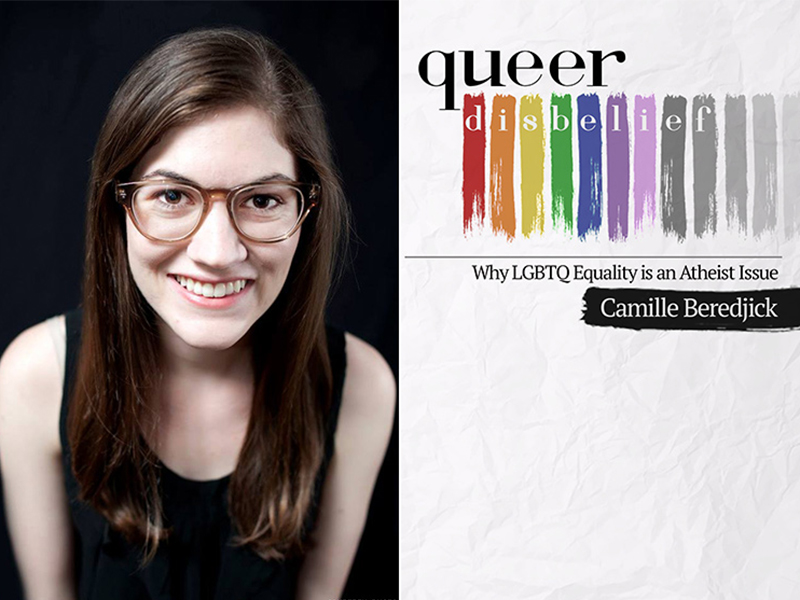
(RNS) — American atheists and other nonbelievers have long acknowledged the debt they owe in their fight for equality to the gay and lesbian community, which began its struggle for the same in the 1960s (and in turn acknowledged its debt to African-Americans).
In her new book “Queer Disbelief: Why LGBTQ Equality Is an Atheist Issue,” queer activist and atheist Camille Beredjick calls for an alliance between those who do not believe in God and those who identify as LGBTQ based on their mutual goals of respect and acceptance.
She spoke with Religion News Service about why these two groups have more in common than they generally acknowledge and how they can work together. The following interview has been edited for length and clarity.
Where did the idea for this book come from?
This book came out of a long, professional relationship between myself and Hemant Mehta, who writes The Friendly Atheist blog. We started to see religious arguments against the movement for transgender rights and it seemed like a good time to talk about how these two groups — atheists and the LGBTQ community — receive outcry from organized religion in a very intense way and to talk about how they can best be allied and what’s at stake when we don’t work together to address our common goals.
[ad number=“1”]
Why are they allies?
When we look at data on the characteristics of these two communities we see there is a ton of overlap between LGBTQ and atheists. Close to half of LGBTQ persons say they are nonbelievers, so from the beginning it is crucial to recognize we are never talking about one community in an isolated way.
Beyond that, so many of the most significant issues facing LGBTQ people can affect atheists in some way, like violating the principles many atheists hold dear. When we see laws that seek to give business owners the right to discriminate against LGBTQ customers based on their religious beliefs, that’s state-sanctioned privileging of one belief system over another. When religious schools that receive taxpayer money can fire LGBTQ people, that’s an infringement of the separation of church and state. And in both cases, the laws that target LGBTQ people could also be used against atheists.
One example I have in the book is of a doctor who denied health care to a baby because the baby had two moms. That is the kind of thing atheists should be furious about because it could be an attack on them, too.
[ad number=“2”]
What can these two groups learn from each other?
Every social justice movement has had to be mindful about being inclusive, but also about being aware of differences. So just as there is not one monolithic LGBTQ community, there is not a monolithic atheist community. Every one brings something different to the table. So while we may have something in common in terms of our nonbelief or our sexual orientation, I think both of these movements can do better in addressing diversity and there are examples where both groups have done that very well and where both groups can look to the other and use that as a model.
You have some very moving stories in the book from people who have experienced discrimination for being a member of one or both of these groups. Is there one that touched you?
I spoke to one young man who is transgender and feels strongly called to be a priest. He spoke about the difficulty of maintaining his faith while coming out, and accepting the idea that the Catholic faith he grew up in would not likely be a safe place for him to pursue the priesthood. The way he put it was so beautiful. He said people cannot prove just by looking at him that he is a man, but it is something he knows he is and that gives him peace.
Likewise, he can’t prove that God exists or that he has a calling to be a priest, but he knows the peace and joy that God and that calling brings him. I thought that was a lovely way to put it.
[ad number=“3”]
You outline practical ways these groups can work for change, like becoming politically involved. But you also have other ideas that are more personal. What are they?
I think if we are seeking opinion change then we have to start storytelling and connecting — not just try to outsmart opponents but try to connect to them with something personal that inspires empathy, not just finger-pointing. If we are going to move this forward we need to start conversations, not shut people down.

Faithful Viewer logo. Religion News Service graphic by T.J. Thomson
